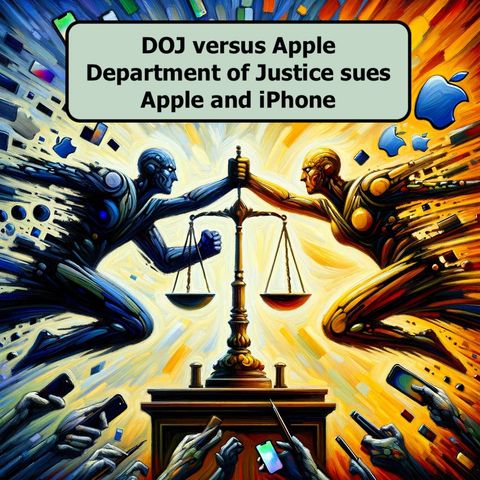Five Pillars of the DOJ's Antitrust Allegations - DOJ vs. Apple for 04/12/2024

12 apr 2024 ·
4 min. 12 sec.
In a significant development in the tech industry, the U.S. Department of Justice (DOJ) has filed an antitrust lawsuit against tech giant Apple. Dated March 21, 2024, the lawsuit accuses...
mostra di più
In a significant development in the tech industry, the U.S. Department of Justice (DOJ) has filed an antitrust lawsuit against tech giant Apple. Dated March 21, 2024, the lawsuit accuses Apple of monopolistic practices within the smartphone market and outlines five specific areas where Apple has allegedly engaged in anti-competitive behavior. The implications of such a case are immense, touching upon consumer choice, market dynamics, and the future regulatory landscape for technology companies.The Five Pillars of the DOJ's Antitrust Allegations Against Apple:
mostra meno
- Blocking 'Super Apps': The DOJ accuses Apple of impeding the development or functionality of 'Super Apps' on its devices. Super Apps are multipurpose applications that provide a wide range of services under one umbrella, such as messaging, payments, and social media functions. The argument posits that Apple's actions limit consumer choice and stifle innovation by preventing other companies from creating comprehensive app ecosystems that could compete with Apple's own services.
- Suppressing Cloud Streaming Services: Apple is also charged with suppressing competition in the cloud gaming and streaming services market. Cloud streaming services allow users to stream video games directly from the cloud without needing powerful hardware. By limiting these services on its devices, Apple potentially protects its own gaming services, such as Apple Arcade, from competition, which could lead to reduced choices and higher prices for consumers.
- Excluding Cross-Platform Messaging Apps: The DOJ's third point of contention involves Apple's alleged exclusion of cross-platform messaging apps, which may refer to limitations or restrictions placed on apps that would allow communication between iOS and other operating systems. This practice could unfairly disadvantage competitors and lock users into Apple's ecosystem, undermining free communication across different device platforms.
- Diminishing the Functionality of Non-Apple Smartwatches: In an era where smartwatches are increasingly becoming an integral part of our daily lives, the DOJ alleges that Apple diminishes the functionality of non-Apple smartwatches when paired with an iPhone. This could manifest as compatibility issues or restricted access to certain features, essentially pushing consumers towards purchasing an Apple Watch to fully enjoy compatibility with their iPhone.
- Limiting Third-Party Digital Wallets: The final accusation focuses on Apple's approach to digital wallets. The DOJ claims Apple limits third-party digital wallets, which could refer to restrictions placed on the NFC chip within iPhones that prevent other digital wallet apps from using it for transactions. This means that Apple Pay may be the only fully integrated digital wallet on iOS devices, which could unfairly restrict competition and choice in the payment services market.
Informazioni
| Autore | QP3 |
| Sito | - |
| Tag |
-
|
Copyright 2024 - Spreaker Inc. an iHeartMedia Company
